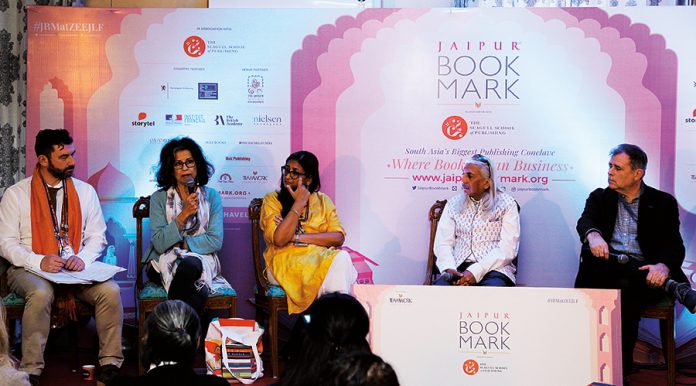By Dharani Dhavamani
At the Jaipur Bookmark 2019, a publishing professionals event which takes place simultaneously with the Jaipur Literary Festival, a roundtable discussion of global literary festivals took place. Neeta Gupta shares her notes of some of the comments.
Paul McVeigh of London Short Story Festival said, “The aim of [our] festival was to make it diverse, apart from being just accessible. Initially, we found that Europe had 3-5% of non-white participation only. So we had to take certain steps to make it inclusive. . . . we had to devise steps to make it better. For example, we did not charge the younger audience and the financially unable for the events.
Authors were encouraged to donate tickets for some of the audience and be a part of workshops. Certain steps were devised in the publishing industry also, where they were keen on publishing stories by non-whites; and to figure out the key reasons as to why there is this gap in publishing. In advertisements, pictures of non-whites were inserted to be more welcoming.
Distribution of Hindi books
Namita Devidayal of the Times LitFest in Mumbai spoke about some of the distribution weaknesses for Hindi books. In the current scenario, there are no systems of distributing Hindi books, i.e. an exclusive system. Four waves of distribution can be traced, based on: mode of books, size of the shops, the internet platform, and so on . . . . So much is yet to be tapped to bring about a single dedicated system for Hindi book distribution, and that is a challenge.
The writers are there – we just have to find them
Geoffrey Taylor of the Toronto International Festival of Authors said, “The purpose of the festival is to reflect the city we live in, on the stage, and that is what we have to encourage. The writers are there – we just have to find them.”
“Anything that happens to you, will also happen to me.”
Ahdaf Soueif of the Palestine Festival of Literature answered a question put to him by JLF organizer Sanjoy Roy, “How do you take responsibility for the audience and speakers?”
Soueif replied, “For the audience, because of their current circumstance in Palestine, they do not have a particular issue, so it is not a hazard. Speakers on the other hand, express their fright of coming to the festival, in the sense that they are scared of the Palestinians. In the end, I had to assure them by saying, “Anything that happens to you, will also happen to me.” One of the incidents was where a Jewish speaker was so frightened during the first two days that he was all pale and did not speak much at all. But towards the end of the festival, he began hugging all of his peers and gained a good level of comfort. A simple view of the truth has led to such a transformation. It has to be acknowledged that there is danger and hardship – but it is worth it all.”
Cultural boycotts – government support and interference
At another point in the discussion, Roy added, “It becomes difficult with this phenomenon of ‘cultural boycott,’ where writers and speakers in an international arena face the consequences of what they do and say. Arts is the only way to bring people together, despite or irrespective of the result – that is the only way to try, because it has value.
Ajit Baral of the Nepal Literature Festival said he and his colleagues were inspired by the JLF. “We organised a festival in 2011 in Kathmandu. It happens now in Pokhara, since it was better in terms of the population and tourism. The major challenges we faced were in terms of funding, since there are no big corporations in Nepal to back the festival. Secondly, there are not a lot of English writers in the country that we can avail for the fest. Thirdly, a strong government is a necessity if such an undertaking has to happen successfully, and that is not the case in Nepal. For instance, the government initially said yes for providing us the funds, but later declined.”
Ajit Pradhan shared the experience of the Patna Literature. Our first year of the festival was really good. It was during the second year that the government got involved. Our USP was that we had six languages represented in the festival panels. However, in 2015, the general election led the government to have some stakes in the festival. For instance, they wanted the picture of the Chief Minister to be on the invitation cards. The influences and pressure from the political agencies was something that was not preferred, and so we had to take a stand and that led to there being no festival for three years. This year, we have managed to ensure that a festival indeed takes place, and are currently working on it.”
“Government sees us both as an example and an irritant,” said JLF co-founder Namita Gokhale.
Cherilyn Parsons described the beginning of the Bay Area Book Festival – “We started the Bay Area Festival in 2015, and we had our inspiration from the JLF. The USP of JLF is that they have a diverse panel, and we try for the same in San Francisco. Berkeley, as we know, is famous for their valuing of Freedom of Expression. Berkeley being vociferous in expressing opinions [especially] in the political arena are very expressive about the goings on. So even the staff gets protective of their view and try to influence panels or decisions. The challenges that we have include security issues, meagre resources, avoiding right wing influence and the staff’s censorship.
Sanjoy Roy, once again in the voice of reason, “Despite there being contradictions and clashes, it is pertinent that we try and give access across the spectrum.”
Emmanuel Delloye of Etonnants Voyageurs weighs in, “We started the Word Alliance with Jaipur-Toronto-Beijing-Edinburgh-Melbourne-Saint Malo. The organisation aims at bringing together festivals/festival organisers that value and follow similar principles, and do not hesitate to prioritise freedom of expression. . . . Freedom is always the freedom of the one who thinks differently.”
Jane McCredie of the Quantum Words Festival – “My goal was to put together Arts and Science, and that was the mission of Quantum Words Festival. For instance, one of our panels had an astronomer, a poet and an indigenous speaker. Making it diverse is something that we focus upon.”
Janhavi Prasada from Himalayan Echoes: The Kumaon Festival of Literature and Arts – “We have a 140 year old ancestral house that we have redesigned and renovated for a literary gathering. Me belonging to a political platform, I have to be extra careful and balance the perspectives. As we are still in the ‘toddler’ stage in terms of festival organisation, we have not faced as much of a political exertion like other festivals have. For instance, we invited the Tibetan leader in exile to give the keynote in 2018, which did not create as many problems as we were warned about. But as the festival progresses, we are getting wary of the politics.
Jayapriya Vasudevan: Times LitFest, Bengaluru – “When I was organising the festival, my prime focus was not only to give voice to the voiceless, but also to give a platform to the debutantes. Politics intervening in the process of festival programming is something that one has to look out for. Getting approvals for having the person who created Austeistan proved to be a problem, so we had to set up a Skype call for her to participate. It is hard to accept that borders are just a line that separates us, to reiterate Gurmehar. In terms of the challenges, certain deliverables that the sponsors impose seem difficult to agree to. For instance, we had iD batter as our sponsors, who wanted the writers-speakers to pose with the batter for marketing. Eventually, I had to actually make them do it! I just want to create a festival where I do not want to give in.”
Mary Therese Kurkalang: Cultures of Peace: Festival of the North East – “For three years, I organised a Literature Festival in the North East along with Preeti Gill. Following that, I have been a part of something called the ‘Gorilla Programming’ where we conduct workshops and plays on diversity, inclusion and national identities. In this project, the major challenges are the restrictions that the government poses on us.”
Meenakshi Alimchandani: associated with Toronto International Book Fair, and Festival of South Asian Literature and Arts – “I have been a part of several festival advisory panels in Toronto, and inclusivity in panels is what I aim at. In this case, I feel that platforms like the Festival Directors’ Roundtable are quite useful. The last time I was here in 2018 was a great opportunity to network with the directors; Geoffrey from Toronto is a perfect example. An important point to encourage is that people should be discouraged from polarising.”
Oliver Moystad: Senior advisor at NORLA – “I am a part of NORLA (Norwegian Literature Abroad). Our mission is to support writers and aid them in any way we can. In Sweden, we are still discussing aspects that are pertinent in this age. The dimensions of the freedom of expression is one such example. One of our book fairs faced a mass boycott situation since one of the right wing journals/papers was given the approval by the organising committee to put a stand at the fair. The approval was given in order to respect the principle of freedom of speech, but it did not bode well with the audience. Other instances include keeping the balance between the conducting of the said events and environmental degradation, which is a pressing issue.”
Marieke Hardy: Melbourne Writers Festival – “The one we did was more like a literary arts festival. I was taken on board to ensure that the festival explores other arts as well, we had speakers and performers interacting and engaging in an interdisciplinary manner, which was great. Programming controversial and conservative speakers in a left wing atmosphere and choosing where to stage the platform and where not to, is a challenge. When one is pretty protective of their festival, how do you set a status quo?”
Pariksith Singh: founder of Optimum Health Care and Auroveda – I am a doctor, and now I am a part of the festival industry. (Sanjoy, “This is where money meets arts.”) I was invited to sponsor a festival in Pondicherry, but did not quite know that it was organised and or patronised by the government. So this led me to be branded as right. But now, I am getting into a groove and learning things in the industry. I quite prefer to keep the youth engaged, in order to keep it alive and interesting.
Sanjoy Roy again interjects, “More than 80% of the audience who attend JLF are less than 30 year old.”
Pravin Sharma: Indore Literature Festival – “I have found that everything has disputes, either between organisations or between the organisation and audience. We have to find how to bridge differences and bring people together.”
Preeti Gill organizer of events at Majha House in Amritsar – “We do have an ancestral home that we use for platforms and events for people and kids. The view of Amristar now is that of guns and violence, and that of the stereotypical Sikh community – dealing with drugs, images, stereotypes, conflicts and partition. So it is important that we try to bridge the difference. It is extremely necessary to make sure that they are made to express.”
Raghav Chandra: Bhopal Literature & Art Festival – We want to have a boutique event. It can be of a small scale, but delve upon seldomly spoken topics. Our main challenge is choosing the writers appropriately and having to justify them. What we have found is that the government officials or the influential people seem to ‘support’ us, but later turn them away. Changes that happen in the government also add to this challenge.
Rima Hooja also of the Bhopal Literature & Art Festival added, “The prime challenges that I would like to point out are that of the pressures imposed by the government, where we have to find ways to tackle them efficiently. It is also equally our duty to safeguard speakers and ethics in the process.”
Smita Parikh: Lit O Fest Mumbai – “Lit O Fest aims at bringing together arts, cultures and languages from all over the country. We employed a few smart strategies to ensure that government intervention does not become a problem. We got all the major people of the government and labelled them as ‘festival supporters.’ So because of that, we always have their blessings and funding during our event-festival. Our next project is to bridge the gap between literature and literacy, and we hope that will create a big positive change.”
French Book Publishers Association – “India is a very important country culturally. My organisation, the French Book Publishers Association wants the countries and people to come together and for the writers to get the exposure that they otherwise do not get.”


















